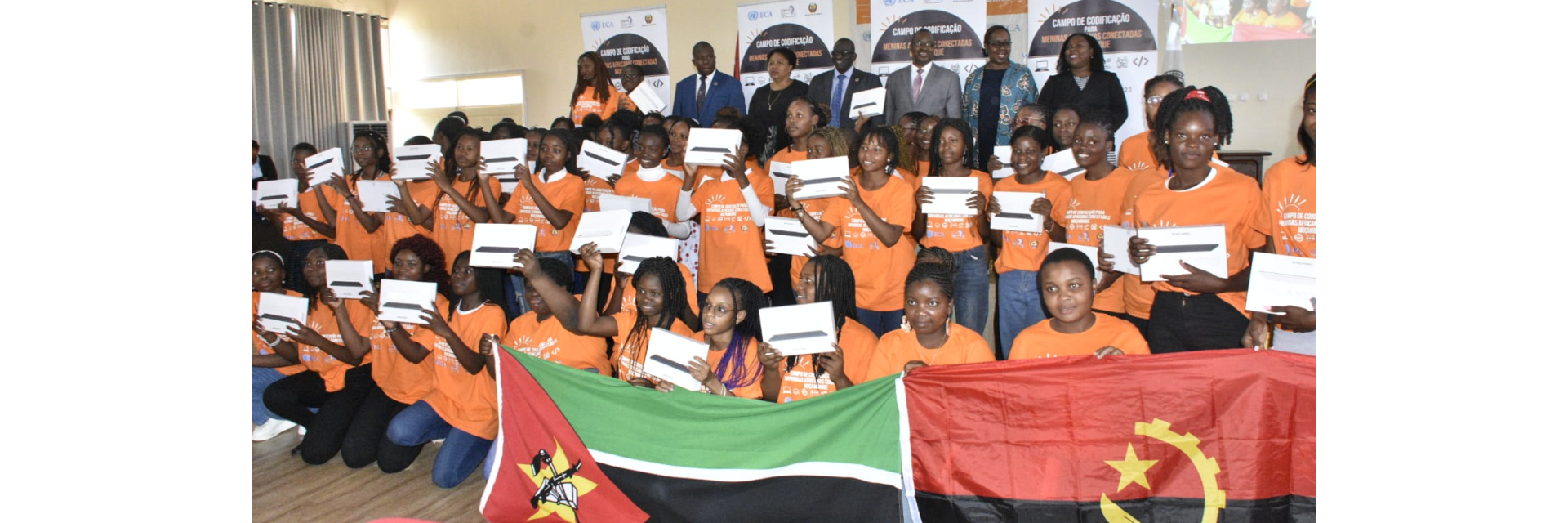Chimoio, 29 October 2023 – ECA in collaboration with the Ministry of Science, Technology, and Higher Education of the Republic of Mozambique, the Administration of Manica Province, Púnguè University, and partners including Infinix, UN Women, and International Telecommunications Union (ITU) concluded the eighth edition of the Connected African Girls Coding Camp in Chimoio, Mozambique.
During the week-long camp, 62 girls received hands-on training in various ICT fields, including Artificial Intelligence, Internet of Things, Robotics, 3D modeling. The attendees join a thriving community of approximately 40,000 alumni who have participated in the Connected African Girls Coding Camp initiative over the past three years.
An Innovation Fair was held as part of the closing ceremony, highlighting 15 exceptional prototypes, created by the trainees who bravely took on the challenge of addressing critical socio-economic issues within their community. This unique opportunity allowed them to present their projects to a diverse audience, articulate their solutions and raise awareness of the challenges they have chosen to address. The girls' creations stand as a testament to the knowledge and skills they acquired during the intensive seven-day coding camp, equipping them with the digital expertise necessary to drive impactful change.
The featured projects encompass a range of critical areas, including enhancing agricultural practices for increased production and distribution, cost-effective recycling methods, early age ICT education, and sustainable practices for environmental protection.
Outstanding prototypes received awards for their ingenuity and innovation in leveraging digital technologies for the advancement of the SDGs. Notably, the most outstanding prototypes showcased a robot and electricity combined flood warning sound system, a 3D printed cane for the deaf and blind, and a specialized hygiene chair designed to assist individuals with reduced mobility. In addition to the tablets provided to all participating girls to equip them with essential tools, 18 girls from the six winning projects were presented with smartphones as a token of recognition for their exceptional efforts.
Keynote speakers expressed their hope that the knowledge and skills acquired by the participants during the camp will empower them to become digital leaders and innovators.
“The true measure of success for this coding camp lies with you, the 62 remarkable young women and girls gathered here from all ten provinces of Mozambique and the Republic of Angola. Our goal is to empower you to not only become future scientists, innovators, and entrepreneurs but also to cultivate confidence and foster your ability to lead positive change in your communities,” said ECA’s Dobrina Poirie.
The President of Púnguè University, Professor Emília Afonso Nhalevilo highlighted the importance of the Coding Camp in achieving SDGs and promoting gender equality in education and technology. Púnguè University, she said, looks forward to continuing its efforts to empower the youth and bridge the digital divide in the region. With the youth accounting for 52% of Mozambique's population, similar trends extend across the continent, projected to reach almost half of the global youth population by 2030.
The organizers lauded the achievements of the young girls and expressed the hope that they would continue to inspire others. The success of the 8th Connected African Girls Coding Camp underscores the importance of digital skills development and gender equality in the journey toward the Fourth Industrial Revolution.
They also noted that to prepare Africa's youth to lead the Fourth Industrial Revolution, initiatives like the Connected African Girls Coding Camp must be championed and scaled. Additionally, there is a need to prioritize the integration of STEAM (Science, Technology, Engineering, Arts, and Mathematics) curricula into formal education, ensure universal and affordable internet access and devices, and make emerging technologies accessible to all.

